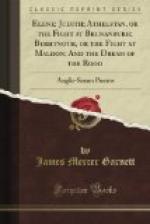[6] Gr. changes MS. naenigum
to aenigum and others follow;
W. as MS.
[7] Foreth-eode, not for-etheode,
‘overcame,’ as Sw. W.’s note
is an oversight.
[8] MS. to þam aeethelinge.
Sw. follows Ruthwell Cross, aeethele
to anum.
[9] Banan must be taken as
gen. pl.; B. reads banana; Sw.
thinks it
“a mistake for some other [word], possibly
beorg,”
and takes banan as gen. sing. referring to the
cross, though
he adds, “this is very improbable.”
Truly so,
as the cross
is speaking.
[10] Maete werode, lit.,
‘with a small band,’ but it means
‘by
himself.’
[11] Greotende is Gr.’s
emendation for MS. reotende; B.
hreotende;
K. geotende; Sw. as Gr.
[12] Stefn is Kl.’s
emendation to fill lacuna. W. prefers
it,
but does not think it convincing.
[13] Us here must refer to
the three crosses, that of
Christ
and those of the two thieves.
[14] This half-line is Gr.’s
emendation to fill lacuna in
MS.
Sw. and W. leave it blank.
[15] Or, ‘of the wicked,’ ‘of criminals.’
[16] I have used this Middle English
word for sake of the
alliteration.
[17] Sw.’s text ends here.
It was translated a few years ago
in
Poet-Lore as if it were the whole poem.
[18] MS. holmwudu; K. holtwudu, and so Gr. with (?).
[19] MS. unforht, but Gr.’s
anforht suits the sense
better.
[20] i.e., ‘by myself.’ See on 69.
[21] Lit., ‘speedy,’ ‘successful.’
[22] A company, a crowd; common in Middle English.



